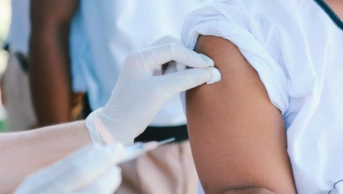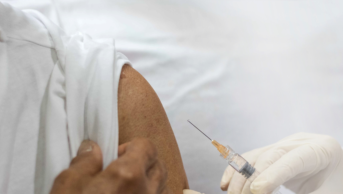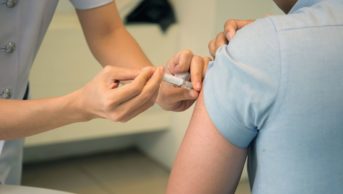
Shutterstock.com
The 1 September 2020 marks the start of what is expected to be the largest ever community pharmacy flu vaccination programme, but funding remains “under negotiation”, according to the Pharmaceutical Services Negotiating Committee (PSNC).
The expanded 2020/2021 flu vaccination programme will cover more than 30 million people — including, for the first time, households of those on the shielded patient list and children in the first year of secondary schools.
People aged 50–64 years are also eligible for a free flu vaccine in England, although they will be invited for a vaccination later in the 2020/2021 flu season subject to vaccine supplies.
For community pharmacists, the new programme brings with it several key changes which, according to the PSNC, are intended to “reduce the burden” on contractors and to help them provide the service at a greater scale than before and in a “COVID-safe manner”.
The changes, published on 28 August 2020, mean that pharmacists are now able to vaccinate people off-site — within professional standards — and can vaccinate patients in any appropriate space within the pharmacy to help facilitate social distancing, although the requirement to have a consultation room remains should a patient request to be vaccinated in one.
In addition, contractors will no longer need to: obtain written consent from the patient, instead verbal consent will be accepted; notify regional teams prior to undertaking vaccinations off-site; or notify a patient’s GP in advance of vaccinating them in their own home or care home. Contractors are now also able to vaccinate care home staff at their place of work.
According to the PSNC, off-site locations will include sites that provide more space for patients, enable proper social distancing and have better waiting facilities in the event of poor weather. Examples include marquees outside the pharmacy premises; local village, town or community halls; church halls, temples or mosques; car parks; and sports halls or stadiums.
The NHS Business Services Authority drug tariff for September 2020 states that a payment of £8.08 will be made to pharmacies for each adult flu vaccination administered, and an additional payment of £1.50 will be paid to cover training and clinical waste costs associated with the vaccination. This is the same payment per vaccination as pharmacists received during the 2019/2020 flu season.
However, on 28 August 2020, the PSNC said that funding was still “under negotiation”, adding that it was “pushing hard for an uplift” and a conclusion to these discussions was expected in the week beginning 31 August 2020.
“PSNC is pleased to have been able to agree a range of new flexibilities which will hopefully help pharmacy teams to achieve significant growth in the number of vaccinations administered, in line with the aspirations of the government and NHS,” said Alastair Buxton, director of NHS Services at the PSNC.
“It is frustrating that we are not able to confirm the funding details for the service so close to its launch, but PSNC believes that continuing to push HM Government and the NHS to provide the right funding for contractors is the right thing to do.”
Nat Mitchell, pharmacist and director of JWW Allison and Sons pharmacy in Cockermouth, Cumbria, said that his pharmacy was still preparing for the service as they were not due to start delivering it until 9 September 2020.
“We are actually going to run our clinics from a hotel three doors away to overcome any social distancing issues,” he said.
“I’m quite open minded to the idea of technicians administering flu vaccines and think that, as long as good quality training is provided, it would be a massive help.”
Deborah Crockford, chief officer at Community Pharmacy South Central (CPSC), said that many of CPSC’s contractors were successfully implementing appointment systems to allow for social distancing requirements and the COVID-19 related hygiene measures.
“Communication between GPs and community pharmacies will be key to ensuring efficient delivery of the service to as many people as possible and our PCN [primary care network] leads will be instrumental in this, with LPC [Local Pharmaceutical Council] support,” she added.
But she said that “despite the multitude of items in the national media where GPs have been interviewed about how they are going to cope with the extra demands of the vaccination service this season, it is extremely disappointing that working with community pharmacies to increase capacity has not been mentioned”.
Michael Keen, chief executive officer of Kingston and Richmond LPC, welcomed the government’s move to expand the available workforce to administer vaccinations, but said that there needed to be “clear information” about their responsibilities in taking on a potential unlicensed vaccine.
“We are of course in unusual times, and the promotion or advertising of unlicensed vaccines (e.g a vaccination for COVID-19) to healthcare professionals [HCPs] may be a part of that; however there must be clear information to the HCPs about the responsibilities that they are taking on administering an unlicensed preparation and what they should say to the patient,” he added.
You may also be interested in

Community pharmacies deliver 2.5 million flu vaccinations so far during the 2020–2021 flu season

Pharmacies in Scotland to provide NHS flu vaccines for the first time in 2020/2021
